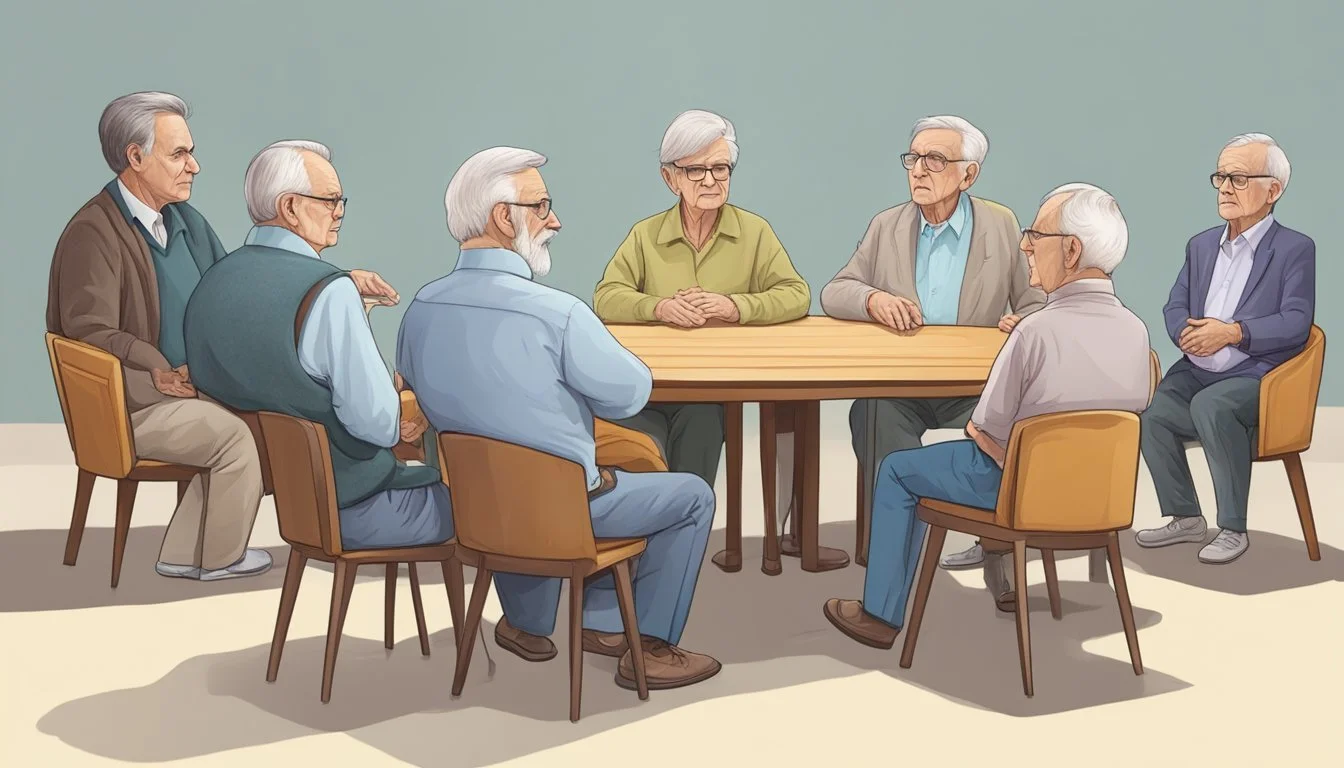Understanding Narcissistic Behavior in Septuagenarians
Narcissism doesn't simply vanish with age. At 70 years old, individuals with narcissistic personality disorder often face unique challenges as they confront the realities of aging. Their grandiose self-image may clash with physical and cognitive changes, leading to increased denial or defiance.
Aging narcissists may experience heightened bitterness and isolation as their social circles shrink and they struggle to maintain their perceived superiority. Some may resort to extreme behaviors or exploitation of others in attempts to preserve their sense of importance. The effects of narcissism can be particularly pronounced in elderly care settings, where the need for assistance conflicts with their self-aggrandizing tendencies.
Research suggests that narcissistic traits can evolve with age, but the core patterns of behavior typically persist. For those interacting with aging narcissists, understanding these dynamics is crucial for managing relationships and providing appropriate care. The intersection of narcissism and aging presents complex issues for both individuals with the disorder and those around them.
Understanding Narcissism
Narcissism is a complex personality trait characterized by an inflated sense of self-importance and a deep need for attention and admiration. It exists on a spectrum, ranging from healthy self-confidence to pathological narcissistic personality disorder.
Defining Narcissistic Personality Disorder
Narcissistic Personality Disorder (NPD) is a mental health condition marked by an excessive need for admiration, a grandiose sense of self-importance, and a lack of empathy for others. Individuals with NPD often display arrogant behaviors and attitudes, struggle with criticism, and have difficulty maintaining healthy relationships.
Key features of NPD include:
Exaggerated sense of self-importance
Preoccupation with fantasies of unlimited success or power
Belief in one's own uniqueness or superiority
Need for constant admiration
Sense of entitlement
Interpersonal exploitation
People with NPD may appear confident and charismatic but often struggle with fragile self-esteem and intense insecurity.
The Role of Empathy in Narcissism
Empathy, or the ability to understand and share the feelings of others, is typically impaired in individuals with narcissistic traits. This lack of empathy is a central feature of narcissistic personality disorder.
Narcissists often:
Struggle to recognize or identify with others' emotions
Dismiss or belittle others' feelings
Focus primarily on their own needs and desires
This empathy deficit can lead to:
Difficulty maintaining close relationships
Inability to provide emotional support
Tendency to exploit others for personal gain
Some research suggests that narcissists may possess cognitive empathy (understanding others' emotions) but lack affective empathy (feeling others' emotions).
Admiration and Approval in Narcissistic Behaviors
The need for admiration and approval is a driving force behind many narcissistic behaviors. Individuals with narcissistic traits often seek constant validation and praise from others to maintain their inflated self-image.
Common behaviors include:
Boasting about achievements or exaggerating abilities
Seeking out compliments and flattery
Becoming angry or defensive when criticized
Surrounding themselves with people who offer admiration
This constant need for external validation can lead to:
Difficulty accepting failure or setbacks
Intense reactions to perceived slights or rejection
Manipulation of others to gain attention or praise
The pursuit of admiration often masks deep-seated insecurities and a fragile self-esteem that requires constant reinforcement.
Aging and Personality
Personality evolves as individuals age, with both positive and negative changes occurring. Wisdom and emotional maturity often increase, while some traits may become more pronounced.
Effects of Normal Aging on Personality and Behaviors
As people grow older, their personalities tend to stabilize. Many become more conscientious and agreeable. Emotional stability often improves, with decreased neuroticism. Older adults may exhibit greater self-acceptance and a more relaxed attitude towards life.
Some negative changes can occur. Cognitive decline may lead to increased rigidity in thinking. Older individuals might become more set in their ways and less open to new experiences. Social interactions may decrease, potentially affecting extroversion levels.
For those with personality disorders, aging can intensify certain traits. Narcissists may struggle more with self-image as physical changes occur. Their need for admiration often remains strong, even as their social circle shrinks.
Typical Emotional Growth in Older Adults
Emotional intelligence typically improves with age. Older adults often display better emotion regulation and conflict resolution skills. They tend to focus more on positive experiences and relationships, prioritizing quality over quantity in social interactions.
Wisdom accumulates through life experiences. Many older adults show increased empathy and perspective-taking abilities. They may become more adept at managing complex emotions and interpersonal situations.
Aging can bring a sense of contentment and acceptance. Many older individuals report higher life satisfaction despite physical limitations. They often develop a more nuanced understanding of themselves and others.
Some challenges exist. Loneliness and depression can affect emotional well-being, especially if social connections diminish. Adapting to retirement and changing family dynamics may require emotional adjustment.
The Aging Narcissist
As narcissists enter their later years, they face unique challenges that can shake the foundations of their self-image. Physical and cognitive changes often collide with their inflated sense of self, forcing them to confront new realities.
Physical Changes and Their Impact on Narcissism
Aging brings unavoidable physical changes that can deeply affect a narcissist's self-perception. Wrinkles, gray hair, and decreased stamina may be particularly distressing for someone who has long relied on their appearance for validation. Many aging narcissists struggle to maintain their image of physical perfection.
They may turn to cosmetic procedures or excessive exercise in an attempt to preserve their youthful looks. Some may become increasingly critical of others' appearances as a way to deflect attention from their own aging process. The loss of physical attractiveness can lead to heightened insecurity and a desperate need for admiration from others.
Cognitive Decline and Narcissistic Tendencies
Cognitive changes in older age can significantly impact narcissistic behaviors. Memory loss and decreased mental sharpness may challenge a narcissist's sense of superiority. They might struggle to maintain their facade of omniscience and infallibility.
Some aging narcissists may compensate by becoming more rigid in their thinking or doubling down on their claims of expertise. Others might withdraw from social situations where their cognitive decline could be exposed. The fear of appearing less intelligent or capable than others can lead to increased defensiveness and aggression.
Facing Limitations and Vulnerability
The aging process forces narcissists to confront their own limitations and vulnerability. Reduced independence and increased reliance on others can be particularly challenging for those accustomed to feeling invincible. Many struggle to accept help or admit to physical or mental decline.
Some aging narcissists may lash out at caregivers or family members who try to assist them. Others might become manipulative, using guilt or charm to maintain control over their environment. The realization of mortality and decreased influence can lead to depression or increased narcissistic behaviors as a coping mechanism.
Relationship Dynamics
Relationships with aging narcissists present unique challenges. Their need for control and attention often intensifies with age, straining connections with family and caregivers.
Maintaining Relationships with an Aging Narcissist
Narcissists at 70 may struggle to maintain healthy relationships due to their heightened need for validation. They often lack empathy and have difficulty seeing others' perspectives.
Family members may feel emotionally drained by constant demands for attention and praise. The narcissist's fear of aging can lead to increased criticism and blame towards loved ones.
Consistent communication and setting clear expectations are crucial. Encouraging the narcissist to engage in meaningful activities can help redirect their focus from negative behaviors.
The Role of Boundaries and Control
Establishing firm boundaries is essential when dealing with an aging narcissist. Their desire for control often escalates as they face physical and cognitive decline.
Clearly defined limits on behavior and demands can help protect caregivers' mental health. It's important to remain calm and assertive when enforcing boundaries.
Narcissists may resist loss of independence fiercely. Gradual transitions and involving them in decision-making can help maintain a sense of control.
Caregiver Challenges and Coping Strategies
Caregivers of aging narcissists face significant emotional and psychological strain. The constant need for admiration and lack of gratitude can lead to burnout.
Practice self-care regularly
Seek support from friends, family, or support groups
Set realistic expectations for the relationship
Professional help, such as therapy or counseling, can provide valuable coping strategies. Respite care options allow caregivers necessary breaks to recharge.
Recognizing manipulative tactics and not internalizing criticism is crucial for caregiver well-being. Maintaining personal boundaries and a strong support network helps navigate the challenges of caring for an aging narcissist.
Psychological Implications
Aging narcissists face complex psychological challenges that impact their mental health and relationships. These issues often manifest as anger, shame, loneliness, and depression.
The Cycle of Anger and Resentment
Narcissists at 70 may experience increased anger and resentment as their perceived status diminishes. They struggle to accept the physical and social changes that come with aging. This frustration can lead to more frequent outbursts and conflicts with family members or caregivers.
Their inability to maintain previous levels of admiration may intensify feelings of resentment. They often blame others for their declining health or reduced independence. This cycle of anger reinforces their narcissistic tendencies and further strains relationships.
Elderly narcissists may lash out at healthcare providers or resist necessary medical interventions. Their anger can make it challenging for others to provide proper care and support.
Shame and Paranoia in Narcissistic Elderly
Aging narcissists often grapple with intense feelings of shame as they confront their mortality and limitations. This shame can manifest as increased paranoia and suspicion towards others.
They may become hyper-vigilant about perceived slights or attempts to undermine their authority. This paranoia can lead to accusations of theft, neglect, or conspiracy against family members or caregivers.
Narcissistic seniors may refuse help or isolate themselves to avoid exposing vulnerabilities. Their shame and paranoia create barriers to receiving necessary care and maintaining social connections.
Loneliness and Depression Risks
The narcissist's demanding and self-centered behavior often pushes away family and friends over time. As they age, this can result in profound loneliness and social isolation.
Their diminished ability to charm or manipulate others may exacerbate feelings of abandonment. The loss of narcissistic supply can trigger depressive episodes or worsen existing mental health issues.
Elderly narcissists may struggle to find meaning or purpose without constant external validation. This existential crisis increases their risk of developing clinical depression or experiencing suicidal thoughts.
Behavioral Patterns and Management
Aging narcissists often exhibit distinct behavioral patterns as they face the challenges of growing older. These patterns can include defiance, denial, and potential narcissistic collapse.
The Defiance and Anger Response to Aging
Narcissists at 70 may respond to aging with increased defiance and anger. They often lash out at those around them, especially caregivers or family members.
This anger stems from a loss of control and diminishing abilities. Narcissists may become more demanding and critical as they struggle to maintain their self-image.
They might refuse help or medical treatment, insisting they don't need assistance. This defiance can lead to conflicts with loved ones and healthcare providers.
Denial of Aging and its Consequences
Many aging narcissists engage in profound denial about their changing circumstances. They may refuse to acknowledge physical limitations or cognitive decline.
This denial can manifest as:
Insisting on driving despite safety concerns
Rejecting mobility aids or home modifications
Dismissing health issues or doctor's recommendations
Denial often extends to financial matters. Narcissists might overspend or make risky investments, ignoring the realities of retirement.
Such behavior can put their well-being at risk and strain relationships with family members trying to help.
Coping with a Narcissistic Collapse
Narcissistic collapse can occur when an aging narcissist can no longer maintain their grandiose self-image. This crisis often results in:
Severe depression
Increased manipulative behavior
Withdrawal from social interactions
Family members may need to intervene to ensure the narcissist's safety and well-being. Professional help is often necessary to manage this collapse.
Coping strategies for caregivers include:
Setting firm boundaries
Seeking support from mental health professionals
Practicing self-care to avoid burnout
It's crucial to remember that the narcissist's behavior is not a reflection on the caregiver's worth or efforts.
Treatment and Therapy Options
Effective interventions exist for elderly narcissists seeking to address their personality traits and improve relationships. These approaches focus on building self-awareness, developing empathy, and learning healthier coping mechanisms.
Accessible Therapies for Elderly Narcissists
Cognitive-behavioral therapy (CBT) can help older narcissists identify and modify destructive thought patterns. This approach teaches skills to manage emotions and improve interpersonal interactions.
Group therapy provides opportunities for narcissists to practice empathy and receive feedback in a controlled environment. Peers can offer valuable perspectives and challenge narcissistic behaviors.
Psychodynamic therapy explores early life experiences that may have contributed to narcissistic traits. This can foster insight and promote emotional growth.
Family therapy involves loved ones in the treatment process. It can repair damaged relationships and create a support system for ongoing change.
Role of Treatment in Empathy Development
Therapy aims to cultivate empathy in narcissistic individuals. Techniques like role-playing and perspective-taking exercises help them understand others' emotions.
Mindfulness practices increase self-awareness and emotional regulation. These skills are crucial for developing genuine empathy and compassion.
Empathy training programs use structured activities to improve recognition of facial expressions and emotional cues. This enhances the ability to connect with others on an emotional level.
Therapeutic interventions also address underlying insecurities and fears that often fuel narcissistic behaviors. By healing these core wounds, individuals can become more open to empathic connections.
Adapting to Change
Aging narcissists face unique challenges as they confront physical and social changes in their later years. Their self-esteem and identity often become strained as they grapple with a shifting sense of self.
Self-esteem and Identity in the Later Years
Narcissists at 70 may struggle to maintain their inflated self-image. Their once-reliable sources of admiration and attention often diminish. This can lead to increased irritability and attempts to reassert control. Some aging narcissists double down on their grandiose behaviors, while others experience a crisis of confidence.
Physical changes like wrinkles or gray hair may be particularly distressing. They might resort to excessive grooming or cosmetic procedures to preserve their youthful appearance. Their identity, so long tied to external validation, can feel threatened by the natural aging process.
Coping strategies may include finding new ways to garner attention or redirecting focus to past accomplishments. Some seek therapy to develop healthier coping mechanisms and a more realistic self-image.
Adapting to Physical and Social Changes
The physical limitations of aging can be especially difficult for narcissists to accept. Reduced mobility or health issues may limit their ability to engage in previously enjoyed activities. This loss of independence can be a significant blow to their self-esteem.
Social changes also present challenges. Retirement may remove a key source of status and recognition. Friend circles often shrink, and family relationships may be strained due to past behaviors. Aging narcissists might struggle to form new connections or maintain existing ones.
Some adapt by seeking leadership roles in retirement communities or volunteer organizations. Others may become more isolated, retreating from social interactions that no longer provide the desired level of admiration. Developing new hobbies or skills can help some narcissists maintain a sense of competence and worth in their later years.
Reflections on Power and Influence
As narcissists reach their 70s, their relationship with power and influence often undergoes significant changes. These shifts can impact their sense of self and interactions with others.
Shifting Dynamics of Power and Control
Narcissists in their 70s may struggle to maintain the level of power they once held. Physical decline and reduced social connections can lead to a diminished ability to manipulate others. This loss of control often causes frustration and anxiety.
Some aging narcissists adapt by seeking new avenues for influence, such as becoming involved in community organizations or local politics. Others may intensify their efforts to control family members or caregivers.
The onset of dementia can further complicate power dynamics. Cognitive decline may erode a narcissist's capacity to scheme and maintain their carefully crafted image.
Influence on Younger Generations
Elderly narcissists frequently attempt to position themselves as role models for younger family members or acquaintances. They may offer unsolicited advice or try to shape others' life choices.
Some find success in mentoring roles, using their experience to guide younger individuals in professional settings. However, their influence can be detrimental if they impose unrealistic expectations or manipulate others for personal gain.
Grandchildren often become a new focus for narcissistic attention-seeking behaviors. Elderly narcissists may compete for the role of favorite grandparent or use gifts to curry favor.
The impact of an aging narcissist's influence on younger generations can be long-lasting, potentially shaping family dynamics for years to come.
Looking Ahead
As narcissists enter their 70s, they face unique challenges related to legacy, life reflection, and emotional growth. The aging process often prompts shifts in perspective and priorities for these individuals.
Legacy and the Aging Narcissist
Narcissists at 70 may become increasingly preoccupied with their legacy. They often seek to solidify their perceived importance and impact on the world. This can manifest in various ways:
• Increased philanthropic efforts • Writing memoirs or autobiographies • Attempting to reconnect with estranged family members
Some may intensify their efforts to maintain control over their image and how they'll be remembered. Others might experience a softening of their narcissistic traits, leading to genuine attempts at reconciliation and relationship-building.
The fear of being forgotten can drive narcissists to pursue grand gestures or projects in their later years. This pursuit of legacy can sometimes lead to positive contributions to society, albeit driven by self-centered motivations.
The Concept of Karma in Life Reflection
As narcissists age, they may begin to contemplate the concept of karma and its relevance to their life experiences. This reflection can trigger various responses:
• Denial of past wrongdoings • Attempts to justify harmful behaviors • Rare instances of genuine remorse and desire for change
Some aging narcissists might experience a form of existential crisis, questioning the impact of their actions on others. This introspection can lead to:
Increased anxiety about judgment or retribution
Efforts to make amends, though often superficial
A reevaluation of personal values and priorities
While true change is uncommon, the contemplation of karma can sometimes spark a degree of emotional growth or wisdom in aging narcissists. This process may result in subtle shifts in behavior or attitudes towards others.







